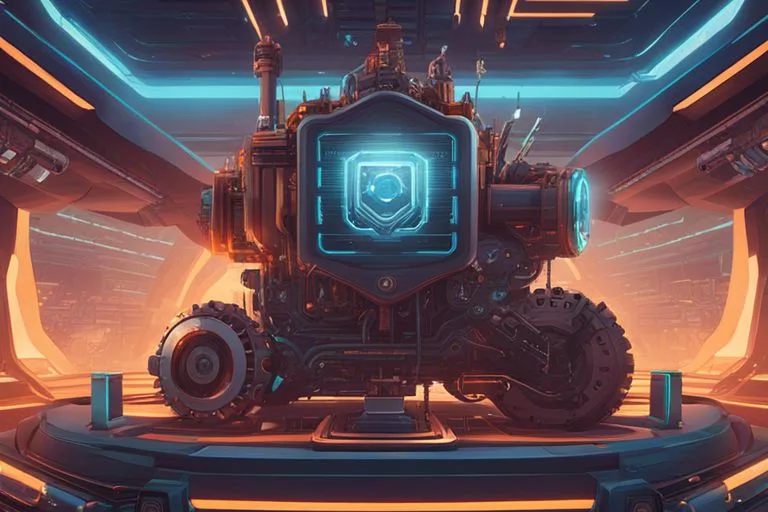What are the Top Game Engines in the Industry Today?
Unreal Engine, Unity, Godot, Amazon Game Engines, CryEngine, and Studios’ Own Game Engines are some of the most popular and powerful game engines in the industry today. These tools play a crucial role in game development, allowing developers to create immersive worlds and captivating experiences for players worldwide.
Unreal Engine stands out for its stunning graphics capabilities and user-friendly interface, while Unity is known for its versatility and accessibility to developers of all levels. Godot is celebrated for its open-source nature and flexibility, making it a favorite among indie developers. Whether you’re working on a small indie title or a blockbuster AAA game, choosing the right game engine is vital for bringing your vision to life.
Overview of Unreal Engine
Your journey into the world of game development just got a whole lot more exciting with Unreal Engine. This powerful game engine, developed by Epic Games, has been at the forefront of the industry for decades and continues to push boundaries with its cutting-edge technology and tools.

Key Features and Capabilities
On top of stunning graphics and immersive gameplay experiences, Unreal Engine is packed with a variety of features and capabilities that make it a favorite among developers worldwide. From advanced rendering techniques to robust physics simulations, Unreal Engine gives creators the tools they need to bring their vision to life.
- High-fidelity graphics
- Blueprint visual scripting
- VR and AR development
- Sequencer Cinematics tool
- Robust physics engine
- Extensive marketplace for assets
Any aspiring game developer looking to create visually stunning and immersive experiences should definitely consider Unreal Engine as their go-to tool.
Industries and Sectors Utilizing Unreal Engine
Engineered for versatility, Unreal Engine has found its way into various industries and sectors beyond gaming. From film and television to architecture and automotive, Unreal Engine is being utilized by professionals looking to create interactive and engaging content.
Any industry or sector that values cutting-edge technology and immersive experiences can benefit from incorporating Unreal Engine into their workflow.
Notable Games Developed with Unreal Engine
An impressive array of games has been brought to life using Unreal Engine, showcasing the versatility and power of this game engine. Titles like Fortnite, Gears of War, and Bioshock Infinite have captivated players with their stunning visuals and engaging gameplay.
Games developed with Unreal Engine continue to push boundaries and set new standards in the gaming industry, solidifying its position as a powerhouse in the world of game development.
Unity
Keep up with the rapidly evolving game development industry by utilizing Unity Engine. This powerful and versatile game engine has gained immense popularity among developers for its ease of use, cross-platform capabilities, and robust features.
One of the standout features of Unity is its intuitive interface, which allows developers to quickly create interactive and engaging 2D and 3D games. With built-in tools for animation, physics, and rendering, Unity simplifies the game development process and enables developers to bring their creative visions to life.

Key Features and Capabilities
Any game developer can benefit from Unity’s extensive list of features and capabilities. Some key highlights include:
- Cross-platform support for easy porting to multiple devices
- Real-time rendering for stunning visuals
- Asset store for accessing a wealth of resources and tools
This enables developers to create high-quality games efficiently and cost-effectively, making Unity a top choice in the industry.
For instance, Unity’s powerful scripting engine allows developers to customize gameplay mechanics and create complex behaviors for characters and objects. This level of control and flexibility is vital for implementing unique game features and enhancing the player experience.
Industries and Sectors Utilizing Unity
For industries ranging from gaming and entertainment to education and architecture, Unity offers a versatile solution for creating interactive experiences. It is a preferred choice for developers looking to build AR/VR applications, simulations, and training programs.
To stay competitive in today’s market, businesses across various sectors are leveraging Unity’s capabilities to develop engaging and immersive experiences for their target audiences. The engine’s adaptability and scalability make it a valuable tool for achieving diverse project goals.
Notable Games Developed with Unity
For both indie developers and AAA studios, Unity has been instrumental in creating successful and critically acclaimed games. Titles such as “Hollow Knight,” “Cuphead,” and “Monument Valley” showcase the versatility and performance of Unity as a game development platform.
Unity has proven itself as a reliable choice for developers looking to bring their game ideas to fruition, with its robust features and support system contributing to the success of numerous gaming projects.
Godot Engine
Not all game engines are created equal, and the Godot Engine has emerged as a key player in the world of game development. With its open-source nature and powerful features, Godot offers game developers a versatile platform to bring their creative visions to life.
Key Features and Capabilities
Godot Engine is packed with features that empower developers to create stunning games with ease. Some of the key functionalities include:
- Visual Scripting for rapid prototyping and development
- Node-based architecture for flexible and efficient workflows
- Multi-platform development support for reaching wider audiences
Any game developer looking to create high-quality games across multiple platforms will find Godot Engine to be a valuable tool in their arsenal.
Community and Open-Source Aspect
For game developers, having access to a strong community can make all the difference. With Godot Engine being open source, developers can collaborate, share resources, and expand their knowledge base together.
Notable Games Developed with Godot
Godot Engine has been used to create a variety of notable games that showcase the engine’s capabilities. From indie hits to commercial releases, Godot has proven its worth in the industry.
Amazon Lumberyard
After recognizing a need in the game development industry for a powerful and versatile engine, Amazon launched Amazon Lumberyard in 2016. This game engine is designed to provide developers with the tools they need to create high-quality, immersive gaming experiences across multiple platforms.

The Amazon Lumberyard engine is based on the popular CryEngine and offers a range of features and capabilities that set it apart in the market. With its advanced graphics rendering capabilities, robust networking tools, and seamless integration with Amazon Web Services (AWS), developers can easily create stunning and engaging games.
Key Features and Capabilities
Knowing the importance of providing developers with cutting-edge tools, Amazon Lumberyard offers a comprehensive set of features to enhance the game development process. Some of the key features include:
- Advanced Graphics Rendering
- Networking Tools
- Integration with AWS
Amazon Lumberyard also includes a range of capabilities such as real-time dynamic global illumination, a visual scripting tool, and support for virtual reality development, making it a versatile choice for developers.
Integration with AWS Services
An integral aspect of Amazon Lumberyard is its seamless integration with AWS services. This allows developers to leverage the power of the cloud for tasks such as database management, AI processing, and multiplayer networking, enhancing the overall gaming experience.
To further streamline the development process, Amazon Lumberyard provides easy access to AWS services, enabling developers to scale their games efficiently and take advantage of cloud-based resources.
Notable Games Developed with Amazon Lumberyard
Integration with leading game studios has enabled the creation of several high-profile games using Amazon Lumberyard. Developed games include:
- Breakaway
- New World
Developed with the power and flexibility of Amazon Lumberyard, these games showcase the engine’s capability to deliver immersive and engaging gaming experiences that captivate players.
CryEngine
Once again, we examine into powerful game engines with CryEngine, a cutting-edge platform known for its stunning visuals and advanced capabilities. On the forefront of game development technology stands CryEngine, a robust piece of software that has been utilized to create visually impressive games across various genres.
Originally developed by Crytek, this engine boasts a reputation for pushing the boundaries of what is possible in terms of graphics and gameplay.
Key Features and Capabilities
- Real-time Rendering
- Advanced Lighting System
- Powerful Particle Effects
- Integrated Physics Engine
After taking a closer look at CryEngine’s capabilities, it becomes clear that its real-time rendering and advanced lighting system set it apart from other engines in the industry. Combined with its powerful particle effects and integrated physics engine, developers have the tools needed to create truly immersive worlds.
Visual Fidelity and CryEngine
The visual fidelity produced by CryEngine is truly remarkable. With features such as realistic environments, detailed textures, and dynamic lighting, this engine is a top choice for developers aiming to create visually stunning games.
Notable Games Developed with CryEngine
Some of the most notable games developed using CryEngine include titles such as Crysis, Hunt: Showdown, and Warface. These games showcase the powerful capabilities of the engine when it comes to creating immersive and visually striking experiences.
Plus, with CryEngine’s continuous updates and support from a dedicated community, it remains a strong contender in the world of game development engines.
Proprietary Game Engines
Unlike popular game engines such as Unreal Engine and Unity, proprietary game engines are custom-built tools developed by individual studios or companies to meet the specific needs of their games.
These engines are tailored to the unique requirements of the projects they serve, offering a level of control and optimization that off-the-shelf engines may not provide.
Advantages of Developing a Custom Engine
Game developers often choose to develop their own proprietary engines for a number of reasons. One key advantage is the ability to tailor the engine to a specific game’s technical requirements and artistic vision. By building a custom engine, developers can optimize performance, enhance visuals, and implement features that are not readily available in existing engines.
Another advantage of proprietary engines is the intellectual property control they offer. With a custom engine, developers have full ownership and control over the technology powering their game, allowing them to protect their innovations and maintain a competitive edge in the market.
Challenges and Considerations
While developing a proprietary engine can offer numerous benefits, it also presents a set of challenges and considerations. One of the main challenges is the time and resources required to build and maintain a custom engine. Developing an engine from scratch can be a time-consuming process, diverting attention and resources away from actual game development.
Additionally, the risks associated with proprietary technology should not be overlooked. Building a custom engine comes with the responsibility of ensuring its stability, scalability, and future compatibility with evolving hardware and software environments.
Examples of Successful Proprietary Engines
Proprietary game engines have been instrumental in the success of many critically acclaimed and commercially successful games. For example, Rockstar Games developed the proprietary RAGE engine for titles like “Grand Theft Auto V” and “Red Dead Redemption 2,” showcasing the power and flexibility of custom-built technology in delivering immersive open-world experiences.
Any studio or company can achieve significant success by investing in the development of their own proprietary engine tailored to their unique creative vision and technical requirements. By building a strong foundation of technology, developers can push the boundaries of innovation and deliver exceptional gaming experiences to players worldwide.
Impact of Proprietary Engines on the Industry
To consider, proprietary game engines play a significant role in shaping the landscape of the gaming industry. Studios that develop proprietary engines often influence industry trends, driving advancements in technology and setting new standards for game development.
By leveraging the flexibility and control offered by custom engines, developers can create groundbreaking experiences that captivate audiences and push the boundaries of what is possible in interactive entertainment.
Emerging and Next-Gen Game Engines
Despite the dominance of established game engines like Unreal Engine and Unity, the industry is witnessing the rise of several emerging and next-gen game engines that are pushing the boundaries of technology and creativity.
Trends and Innovations in Game Engine Technology
Innovations in game engine technology are driving the industry forward at a rapid pace. Advanced features such as real-time ray tracing, machine learning integration, and procedural generation are becoming more common, allowing developers to create more immersive and dynamic game worlds.
Additionally, cloud-based rendering and streaming services are revolutionizing how games are developed and played, paving the way for more accessible and scalable experiences.
The Role of Virtual Reality and Augmented Reality
Game engines are playing a crucial role in the adoption and advancement of virtual reality (VR) and augmented reality (AR) technologies. With the ever-growing demand for immersive experiences, game engines are powering the development of VR/AR applications across various industries, including gaming, entertainment, education, and healthcare.
Emerging trends suggest that VR/AR capabilities will continue to be a major focus for game engine developers, with seamless integration and optimized performance being key priorities in enhancing the overall user experience.
Potential Game Changers in the Engine Market
To keep up with the evolving landscape of game development, industry leaders are exploring innovative solutions in engine technology. Concepts such as real-time collaborative editing, AI-driven content creation, and blockchain integration are shaping the future of game engines, offering new possibilities for developers to streamline workflows and create groundbreaking experiences.
Virtual production tools, powered by game engines, are also gaining traction in the entertainment industry, enabling filmmakers to visualize and interact with digital environments in real-time. This convergence of game engines and film production is reshaping the way stories are told, blurring the lines between traditional media and interactive experiences.
Choosing the Right Game Engine
For developers commencing on a game development journey, selecting the appropriate game engine is paramount. It is crucial to evaluate several key factors based on the specific requirements of the project.
- Graphics, performance, and platform compatibility are crucial considerations when selecting a game engine.
- The scalability of the engine and its ability to handle complex gameplay mechanics should also be evaluated.
- The ease of use and available development tools can significantly impact the development process.
The decision should be based on a thorough analysis of these factors to ensure that the chosen game engine aligns with the project requirements.
Budget and Resource Constraints
To make an informed decision, developers must consider their budget constraints and available development resources. On top of the initial cost of acquiring a game engine license, ongoing expenses such as training and support should be factored in as well.
A robust project management strategy that accounts for these financial and resource constraints is vital for successful game development. The allocation of resources should be efficiently managed to prevent any setbacks during the development process.
Community Support and Learning Resources
For developers, having access to a knowledgeable community and a wide range of learning resources can be invaluable. When choosing a game engine, it is vital to consider the presence of an active community that can provide guidance and support throughout the development process.
For instance, the Unreal Engine community boasts a vast network of developers who regularly share insights and best practices, making it a popular choice among aspiring game creators.
Conclusion
With these considerations in mind, it is clear that the top game engines in the industry today offer a vast array of tools and features to game developers, enabling them to create stunning and immersive gaming experiences.
Unreal Engine, Unity, and Godot stand out as popular choices due to their accessibility, robust capabilities, and extensive community support. Amazon Game Engines and CryEngine also offer unique features that cater to specific needs within the gaming industry.
Ultimately, the choice of game engine depends on the specific requirements of each project and the developer’s familiarity with the platform. Some studios even develop their own game engines to suit their particular needs.
As technology continues to evolve, game engines will undoubtedly play a crucial role in shaping the future of the gaming industry, driving innovation and pushing the boundaries of what is possible in the world of game development.

